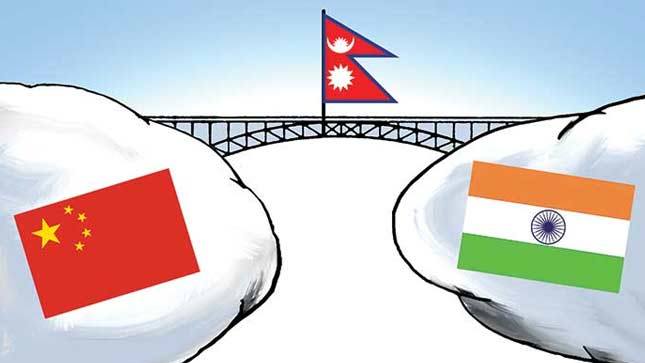 By Ritu Raj Subedi (June 16, 2017)–After passing his mantle on to Nepali Congress President Sher Bahadur Deuba, former prime minister and CPN-Maoist Center Chairman Pushpa Kamal Dahal Prachanda is basking in the glory of the “success” of his 10-month tenure as the head of government.
By Ritu Raj Subedi (June 16, 2017)–After passing his mantle on to Nepali Congress President Sher Bahadur Deuba, former prime minister and CPN-Maoist Center Chairman Pushpa Kamal Dahal Prachanda is basking in the glory of the “success” of his 10-month tenure as the head of government.
Prachanda had become prime minister by unceremoniously toppling former PM and CPN-UML Chairman KP Sharma Oli, who had become a bête noire of India for two reasons. First, Oli led the constitution-making process from the front, defying India’s desire to be a stakeholder in Nepal’s domestic politics. Second, he stood up to the Indian embargo imposed in the wake of a devastating earthquake and entered historic trade and transit accords with China.
Former PM Prachanda claimed to have scored a string of gains during his short term, but the execution of his foreign policies has come under critical scrutiny.
Immediately after taking office, Prachanda openly advocated a new tilt towards India, arguably to “balance” Nepal’s foreign relations with the two neighbors. His flirtation with the southern neighbor was reflected in Point No 11 of a 25-point joint communiqué signed by the Nepalese and Indian prime ministers during PM Prachanda’s visit to India in mid-September 2016. It reads, “The two Prime Ministers believe that both countries hold similar views on major international issues, including the comprehensive reforms of the UN and other international organizations, affecting the developing countries and work in close coordination with each other in the United Nations and other international fora.”
Nepal and India don’t hold similar views on key international issues given their dissimilar goals and priorities. The two nations vastly differ in size of economy, population and geography. The controversial statement undermined the country’s independent foreign policies based on the principles of non-alignment, Panchsheel (five principles of peaceful coexistence) and the UN Charter.
The postponement of Chinese President Xi Jinping’s visit to Nepal was largely due to his apathy. With the deferment of Xi’s visit, Nepal saw a huge amount of aid and Chinese investment slip through its fingers. Similarly, he demonstrated a sheer disregard for the signing of China’s Belt & Road Initiative (BRI) for months.
In order to mitigate his embarrassment, he finally inked the MoU on the BRI at the end of his tenure. It was a big achievement of his premiership, but critics argue Nepal put conditions in it to meet the interest of other foreign powers. He also hurt Nepal’s nonalignment foreign policy when his government issued a statement against Pakistan in the wake of the postponement of the SAARC Summit in 2016.
The growing anti-Chinese activities taking place under his nose were a disgrace to the conduct of his foreign policies. His ally and incumbent PM Sher Bahadur Deuba shared a forum with representatives of the Dalai Lama in India last year. Just a few weeks ago, a climber waved the flag of free Tibet on the peak of Mt Everest. Prachanda’s failure to contain pro-Tibetan activities raised questions regarding his commitment to a One-China policy.
Nonetheless, his positive steps to improve relations with China helped him remove the label of pro-Indian PM and enhance his image at home. The joint military drill between the Nepal Army and the People’s Liberation Army, his meeting with Chinese President Xi in Beijing, the signing with the BRI, the commitment of investment by Chinese investors and the awarding of the Budhi Gandaki Hydropower Project to China Gezhouba Group Corporation were some notable developments undertaken by Prachanda to bring Nepal-China relations back on track during his tenure.
Foreign affairs expert Hiranya Lal Shrestha says that in the beginning Prachanda tilted towards India to secure his position, but in the latter months he succeeded in maintaining balanced relations with neighbors.
“Prachanda has shown that unlike Bhutan, Nepal should not be seen to be in India’s pocket,” he said, adding that the government of Narendra Modi tried to use the Dalai Lama to sour Nepal-China relations.
According to him, Nepal’s commitment to the One-China policy is beyond question, but shortcomings lie in its effective implementation. However, Dr Upendra Gautam terms the foreign policies of Prachanda as “manipulative.” “Prachanda brought into play the manipulative foreign policies that are not based on broader national interest. Rather they are guided by strategy to appease neighbors to meet personal or partisan interests,” notes Dr. Gautam, general secretary of the China Study Centre.
(Mr. Subedi is an associate editor of Kathmandu-based The Rising Nepal. This article was originally published in China.org.cn. Opinion articles reflect the views of their authors, not necessarily those of China.org.cn.)

